Oct 7, 2025 – Visits to Stimson Center and American Enterprise Institute, Departure from the US
Hello. Today marks the final day of Sunim’s Washington D.C. schedule and the conclusion of his 13-day tour of the eastern United States. In the morning, he will visit the Stimson Center, followed by the American Enterprise Institute (AEI) in the afternoon, before returning to Korea.
Sunim began his day at 5 AM at the Washington DC Jungto Center with morning practice and meditation. After breakfast, he packed his belongings for the return journey and inspected the meditation hall building currently under internal construction. After completing the inspection, Sunim provided meal expenses to the construction workers and encouraged them to finish the work well.
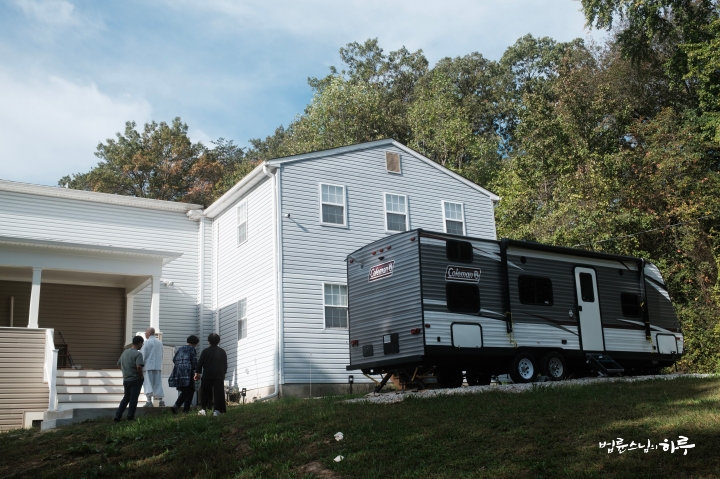
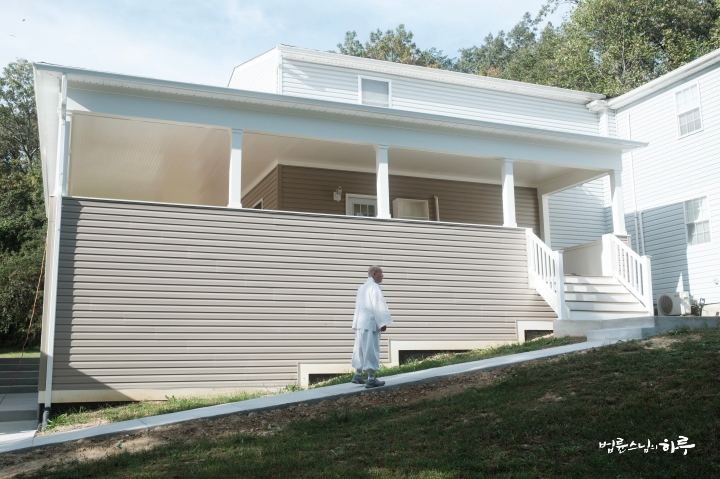
He then toured the entire Washington DC Jungto Center and shared various opinions about future maintenance directions with Min Deokhong, who is in charge of construction affairs.
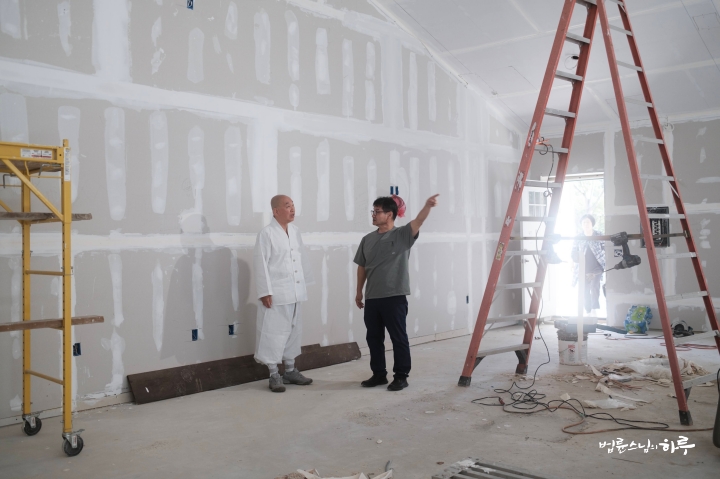
After completing the thorough inspection, Sunim took a commemorative photo in front of the center with Dharma Teacher Beophae and Min Deokhong, who had coordinated and supported the North American lectures and Washington D.C. schedule.
“Thank you all for your hard work.”
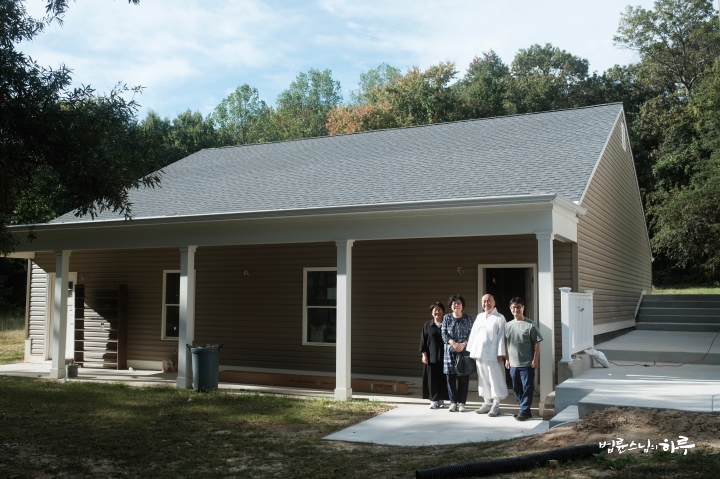
After loading all the luggage into the vehicle, they departed from the Washington DC Jungto Center at 9:50 AM for Washington D.C. The first appointment was at 11 AM at the Stimson Center near Dupont Circle.
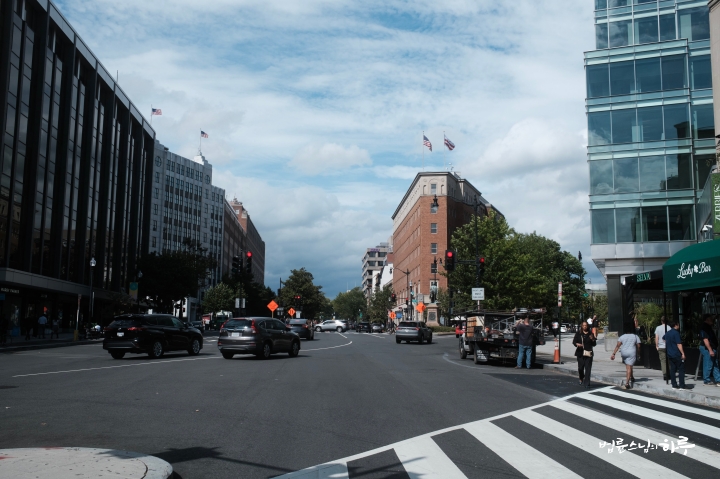
The Stimson Center is a nonprofit, nonpartisan think tank based in Washington D.C., established in 1989. It focuses on promoting global peace and stability through work on international security, nuclear nonproliferation, arms control, and humanitarian crisis response. Recently, it has strengthened its research on the Korean Peninsula, launching the ‘Korea Program’ in 2024. Building on the existing ’38 North’ program, it analyzes strategic and non-traditional security issues related to North and South Korea and the US-ROK alliance.
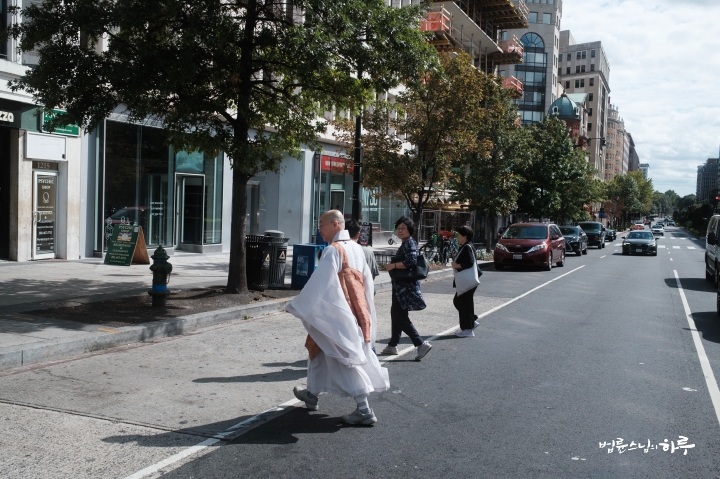
The ’38 North’ program is a specialized platform created for in-depth analysis of North Korea’s political, economic, and military trends. Through satellite imagery analysis, sanctions effectiveness assessment, and nuclear and missile program research, it is recognized as a leading think tank-based media outlet that enhances transparency and policy understanding of North Korea-related information.
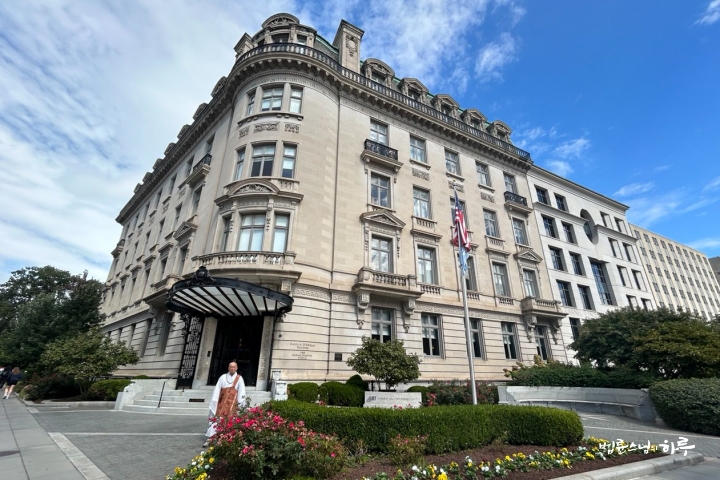
Upon arrival at the Stimson Center, Senior Fellow Jenny Town warmly welcomed Sunim. Jenny had maintained a connection with Sunim since her time at Johns Hopkins University’s School of Advanced International Studies, but their schedules had not aligned for a meeting until now. This was Sunim’s first visit to the Stimson Center.
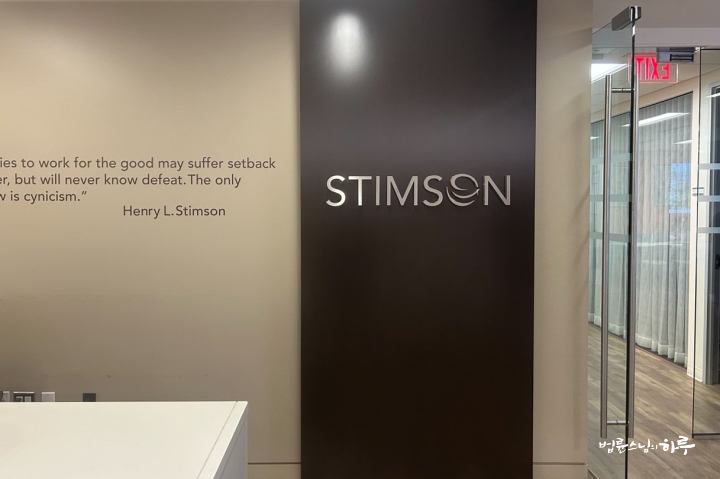
After exchanging greetings with Jenny and her colleagues, Sunim engaged in an in-depth conversation focusing on North Korea’s economic trends, the sharp decline in exchange rates, food situation, and the possibilities for US-North Korea relations and humanitarian exchanges.
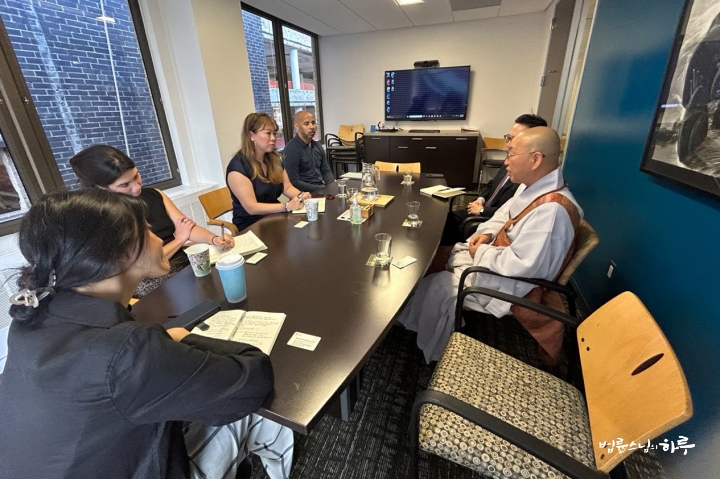
Initially, Sunim shared his recent observations from the China-North Korea border region, analyzing the increase in construction within North Korea, the government-led import structure, and sources of foreign currency inflow. They then discussed causes of the exchange rate collapse, the spread of electronic payment systems, the 20×10 policy, and changes in North Korea’s economic policies such as wheat cultivation expansion. The conversation continued with topics including Korean Americans’ hometown visits, humanitarian aid, repatriation of US military remains, and Buddhist social engagement.
North Korea’s Economy: Surface and Reality, and the Practical Path to Peace
“North Korea’s economy appears improved on the surface, but people’s lives remain difficult. While many buildings have been constructed and imports have increased, there are no goods in the markets and people lack purchasing power. Some experts believe the government is controlling the markets, but the shrinking of jangmadang (markets) seems more due to shortage of goods and declining purchasing power.
The sharp exchange rate collapse in North Korea is difficult to explain through economic factors alone. Some scholars say rumors of currency reform spreading within North Korea were the cause, and if true, this should be seen as non-economic factors at work.”
Jenny showed deep interest in Sunim’s field-based analysis, particularly noting the connection between the exchange rate collapse and the spread of electronic payments. She explained that about 12 Alipay-style electronic payment systems exist in North Korea, with these systems maintaining exchange rates lower than actual rates to encourage people to convert cash to apps. She also agreed with Sunim’s mention of wheat cultivation expansion and agricultural changes, adding that North Korean media had many reports encouraging crop rotation, which could lead to soil recovery and increased yields. Finally, regarding Sunim’s proposed humanitarian exchanges between the US and North Korea, she evaluated that this approach could provide practical opportunities to open doors for relationship improvement beyond political confrontation.
At the end of the meeting, Kelly from the Smithsonian Museum was specially invited to attend. As a Buddhist, Kelly said she wanted to meet Sunim in person, expressing surprise at seeing a monk actively engaged in solving social problems, as she had only known Buddhism as a religion that quietly pursues inner peace through meditation.
Sunim explained in detail the various social engagement activities of Jungto Society and shared the meaning of Buddhist practice.
“Jungto Society is based on meditation and study of the Dharma for mental stability. While traditional Buddhism tends to be religious in nature, focusing on praying for blessings or the afterlife, Jungto Society is not such faith-centered Buddhism but rather practical Buddhism that greatly values social participation activities centered on volunteer work. Based on Buddhist thought and the spirit of compassion, we conduct movements for peace on the Korean Peninsula and humanitarian aid projects for neighbors in need. Beyond humanitarian aid to North Korea, we provide disaster relief in Southeast Asia, war damage recovery in Syria, refugee support in Myanmar, and assistance to untouchables in India. All these activities are deeply connected to Buddhism’s spirit of compassion.”
After the meeting lasting about an hour and a half, Sunim presented the participants with English editions of “Revolutionary Buddha” and “Letters of Hope.” Everyone expressed their desire to visit the Washington DC Jungto Center.
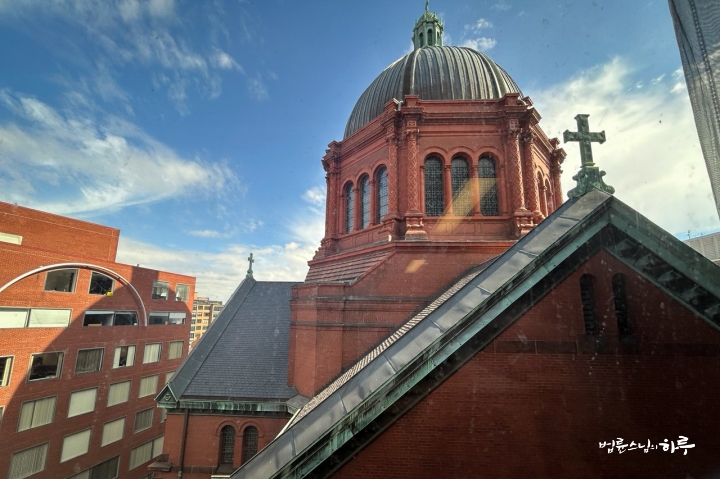
After a quick lunch at a nearby restaurant, they moved to the next meeting location, the American Enterprise Institute (AEI). AEI is a policy research institution established in 1938 by New York businessman Lewis H. Brown and others. It is a center-right think tank oriented toward free market economics and democratic capitalism. In Korean Peninsula-related areas, it influences policy formation inside and outside the US through reports and policy analyses on the US-ROK alliance, North Korean denuclearization, strategic competition in East Asia, and technology and trade policies.
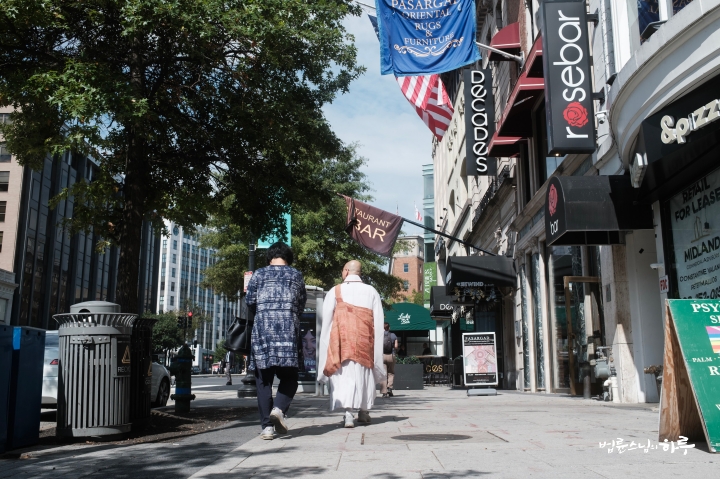
Upon Sunim’s arrival, Dr. Nicholas Eberstadt warmly welcomed him.
Dr. Eberstadt holds the Henry Wendt Chair in Political Economy and is well known for his authoritative research on demographic, economic, and security issues in North Korea and East Asia. Through numerous books and policy reports analyzing the stability of the North Korean regime and implications of demographic changes, he has continued to provide consultation and testimony to the US Congress and government agencies.
Sunim and Dr. Eberstadt have maintained their connection since the early 2000s, meeting again after about four months since last June. After warm greetings, they engaged in an in-depth conversation centered on the Korean Peninsula situation, sustainability of the North Korean regime, economic structural imbalances, the stalemate in US-North Korea relations, and the possibilities for a peace process. The conversation encompassed the effects of economic sanctions and self-reliance policies, how the North Korean regime maintains control, and long-term possibilities for the US-ROK alliance and peaceful unification. Sunim presented his field observations of North Korea’s reality and practical approaches to peace on the Korean Peninsula, while Dr. Eberstadt connected these with demographic and economic data-based analysis.
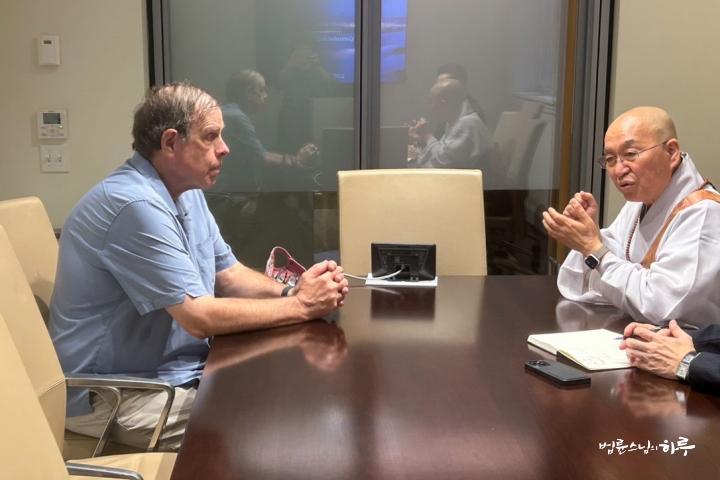
“The North Korean regime is more likely to collapse from internal contradictions than external pressure. Sanctions that isolate North Korea may be effective in the short term, but in the long term, they only increase the suffering of North Korean people and may actually strengthen the regime. Ultimately, the starting point for peace must begin with ‘recognizing the other’s security.'”
Sunim emphasized trust over sanctions and gradual change over collapse. In response, Dr. Eberstadt said that while many scholars in the US agree that the ‘gradual unification through trust’ approach Sunim presented is morally valid, policies centered on ‘deterrence and pressure’ still prevail in political reality.
At the end of the conversation, the professor deeply agreed with Sunim’s words that “recognizing the other’s security is indeed the starting point for peace,” and expressed his desire to widely share this perspective from academic and ethical dimensions going forward.
After the conversation, when Sunim presented his translated books as a token of gratitude, saying “This is my original duty,” the professor smiled brightly with joy.
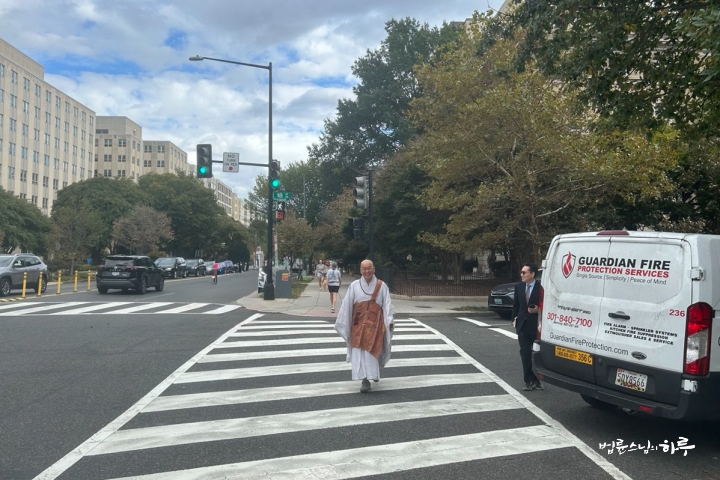
After leaving AEI, they bid farewell to Jason, who had provided interpretation. Sunim presented Korean pears and traditional rice snacks as Chuseok gifts to Jason, who had accompanied them for three English interpretation lectures and five days of activities in Washington D.C.
This concluded all activities in Washington D.C. After finishing the schedule, they moved to Ronald Reagan Washington National Airport (DCA) to drop off the staff member who had handled video recording for 10 days, then Sunim proceeded to Washington Dulles International Airport (IAD) for departure procedures. Before entering the departure area, Sunim expressed his gratitude to the volunteers who had accompanied him.
“Thank you all for your hard work.”
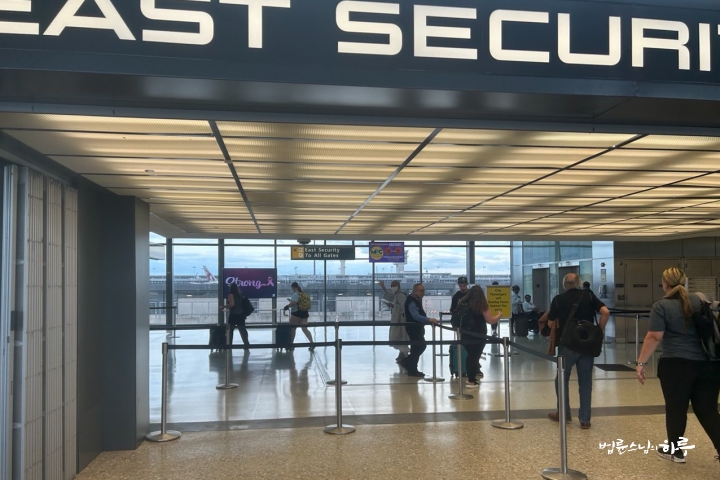
The flight departing Washington D.C. at 6:30 PM arrived at LAX after about 5 hours and 30 minutes at 9 PM local time. After a 2-hour layover, it departed again at 11 PM and after 13 hours of flight, is scheduled to arrive at Incheon Airport at 4 AM on October 9, two days later by local time.
With this, Sunim has safely completed all of his North American East Coast lecture tour and Washington D.C. visit schedule. Starting tomorrow, we will bring you news from Korea.
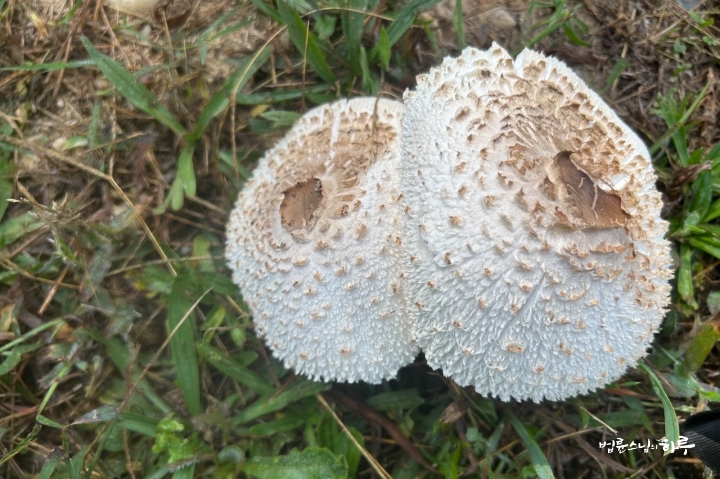
Since there was no Dharma talk today, We’ll conclude by sharing a dialogue between Sunim and a questioner from the Dharma Q&A conducted with English interpretation at Johns Hopkins University on October 1st.
What If I Disappoint My Parents by Following My Own Path?
“For example, let’s say there’s a pretty female student here. She’s so pretty that you want to hug her. What should you do? If you hug her, you could become a sexual harasser and spend a year in prison. It could also be reported in the newspapers, greatly damaging your reputation. What choice should you make in this situation? Generally, people say ‘So you shouldn’t hug her.’ But you ask, ‘How can I not hug her when I want to?’ Then I say, ‘Hug her! And go to prison. Don’t regret it later and accept that at least you got to hug her once!’ This is also one way to escape from suffering.
Knowing that such actions lead to such losses and therefore not doing them is practice, and conversely, accepting the losses that occur when you do act is also practice. However, society often emphasizes the ‘don’t do it’ side. This is because most people regret it later. That regret is suffering.
Whatever choice you make, you must take responsibility for the consequences. The reason you hesitate to make choices is not because of whether the choice is good or bad, but actually because you don’t want to accept the results and don’t want to take responsibility. Every choice comes with responsibility. Rights also come with responsibilities. If you exercise your rights, you must also bear the corresponding responsibilities. Nothing is absolutely good or bad. It’s just that if you do this, you get this result. So whether you anticipate the result and don’t create the cause, or create the cause knowing the result and accept the consequences – that is your choice.
If you want to play, then play. But regrets may follow, such as disappointing your parents or not getting your degree. That regret is suffering. If you’re prepared to accept the consequences, you should give up your degree and tell your parents.
‘What’s more important – that I get a degree or my health? I think my health is more important, so I gave up my degree.’
You should be able to say this. And you must also accept the criticism that comes with it. This is the attitude of taking responsibility for your own choices.
Wanting to get a degree is not greed. However, wanting to get a degree without sufficient effort is greed. Creating results is not the only solution. Quitting is also a solution.
There was actually a student who graduated from Seoul National University and spent about 7 years in a doctoral program at a university in Illinois. He came to me saying he had newly interpreted the Diamond Sutra. When I listened to his story, he had done deep research. However, to my eyes, he seemed to have severe psychological anxiety. If he continued studying, it seemed he would develop mental illness. How could someone pursuing a doctoral degree be studying the Diamond Sutra? His psychological anxiety had directed his interest elsewhere. So I advised him to give up his degree, but he strongly opposed it. The biggest reason was his parents. His parents had struggled to run a store and sent him to study in America, and he couldn’t betray their hopes. But from the parents’ perspective, what’s really important – the degree or their son’s health? True parents would consider their son’s health more important. As a result, he returned to Korea and now lives farming at the foot of Jirisan Mountain. He’s married with three children. He’s living well, taking care of his parents – what’s the problem?
I’m sorry to tell this story to students who are studying, but I think each of your health and happiness is more important than degrees. It’s not desirable to force yourself to study while overcoming suffering. You are in good conditions to enjoy studying. If you want to study and date, do both. Study together while dating. If you want to drink while studying, talk about your studies while drinking with friends. The important thing is that as long as you don’t give up, you don’t stray from the purpose of studying. So keep studying at the center and do other things alongside it.
Looking back, the period of studying is the golden age of life. The leisurely time in your life when you can just eat and study will not come again. Many people want to study but can’t because they have to earn money. But aren’t you just eating and studying? (laughter)
The reason I’m saying these things that may sound unreasonable to you is because I hope you’ll study more joyfully. I farm very joyfully. You should study joyfully too. If it’s not fun at all, you can quit. How can research that’s not even interesting to me help the world? Even when I research something I’m very curious about and enjoy, people often aren’t very interested. So I hope you’ll study more lightly and joyfully.”
“Thank you. I understand well.”
,





